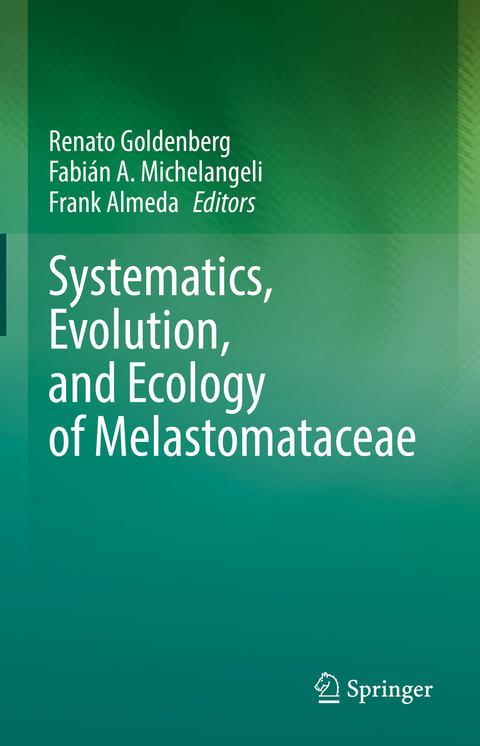
Systematics, Evolution, and Ecology of Melastomataceae
Springer International Publishing (Verlag)
978-3-030-99741-0 (ISBN)
This book presents a synthesis of critical new information for the Melastomataceae, one of the ten richest families among flowering plants with over 5,800 species that has its diversity highly concentrated in tropical or subtropical areas. It describes the family's global diversity and distribution and summarizes recent advances in systematics, evolution, biogeography, reproductive biology and ecology.
lt;p> Renato Goldenberg is a full professor ("Professor Titular") at the Botany Department in the "Universidade Federal do Paraná", in Curitiba, Brazil. He studied Agronomy at "Universidade de São Paulo", then got both his masters and PhD on Vegetal Biology at the "Universidade Estadual de Campinas", with a short internship at the National Museum of Natural History, in Washington, DC. He spent two sabbatical periods in the US, working at the New Your Botanical Garden and, again, at the National Museum of Natural History. Nowadays he teaches mostly plant systematics and field botany for undergrads, and also in the botany / vegetal biology graduate programs at his home institution and also at UNICAMP. His research focuses on the taxonomy, systematics and any other topic related to Melastomataceae. He is currently section editor for Phytotaxa and the Brazilian Journal of Botany, and receives a productivity research grant from CNPq (Brazil).
Fabián A. Michelangeli is the Abess Curator of Tropical Botany in the Institute of Systematic Botany of the New York Botanical Garden. He studied Biology in his native Caracas at the Universidad Central de Venezuela, and obtained a PhD in Plant Sciences from Cornell University. His research focuses on the systematics, taxonomy and evolution of tropical plants, especially on the family Melastomataceae. He also teaches in the graduate program in Biology at the City University of New York and Forestry and Environmental Sciences at Yale University. He has been an Associate Editor of Brittonia since 2004.
Frank Almeda is Curator Emeritus of Botany in the Institute for Biodiversity Science and Sustainability at the California Academy of Sciences (CAS) where he also served two terms as Director of Research. He did his undergraduate work in Botany and Bacteriology at the University of South Florida (Tampa) and then earned a PhD in Plant Sciences at Duke University. His research focuses on the Systematics and evolution of tropical vascular plants with a special emphasis on Melastomataceae and Symplocaceae. Before official retirement he was also Research Professor of Biology at San Francisco State University (SFSU) where he served as major professor to numerous graduate students in the SFSU/CAS joint training program, an activity that he continues. He currently serves on the Editorial Board of Harvard Papers in Botany.
1. Melastomataceae diversity and distribution.- 2. History of Classification of the Melastomataceae.- 3. General morphology and terminology.- 4. Historical biogeography of Melastomataceae.- 5. An overview of Melastomataceae classification and phylogenetics.- 6. Revisiting character evolution in the Myrtales and its bearing on classification: Should the circumscription of Melastomataceae include the "memecyloids"?.- 7. Systematics of Kibessieae.- 8. Systematics of Astronieae.- 9. Phylogeny and systematics of Henrietteeae.- 10. The tribe Miconieae: many genera or one genus?.- 11. Systematics and taxonomy of the Merianieae.- 12. Systematics of Bertolonieae and Trioleneae.- 13. Systematics of Blakeeae.- 14. The tribe Cyphostyleae; exceptions that prove the rules.- 15. Systematics of Sonerileae and Dissocheteae: creating order out of chaos.- 16. Systematics of Cambessedesieae.- 17. Systematics of Rhexieae.- 18. Systematics of Microlicieae.- 19. Systematic studies in the Neotropical tribe Marcetieae.- 20. Melastomateae: a review on the taxonomic history- morphology- molecular phylogeny and biogeography.- 21. Comparative floral ontogeny of Melastomataceae.- 22. Seed morphological features in Melastomataceae.- 23. Patterns of Chromosome Number Diversity and Evolution in the Melastomataceae.- 24. Apomixis in Melastomataceae: Diversity of developmental mechanisms and ecological consequences.- 25. Pollination syndromes and flower diversification in Melastomataceae.- 26. Stamen diversity in Melastomataceae: morphology- color and function.- 27. Patterns of diversification of Miconia (Miconieae) in the Greater and Lesser Antilles.- 28. Colonization by Melastomataceae and its diversification in the Atlantic Forest.- 29. A review of the paleobotanical record of Melastomataceae.- 30. Shapes of species responses to soil fertility in lowland Amazonian Melastomataceae.- 31. Seed germination ecology in Neotropical Melastomataceae.- 32. Seed dispersal ecology in Neotropical Melastomataceae.- 33. Myrmecophytism in the Melastomataceae.- 34. How non-native invasive Melastomataceae inform a greater understanding of the biology and genetics of the family.- Conclusions.
"The book Systematics, Evolution, and Ecology of Melastomataceae is a comprehensive and up-to-date synthesis of our knowledge on a fascinating, widely distributed, and highly diversified family of flowering plants. ... I would recommend this book to anyone who is interested in the Melastomataceae, or in tropical plant diversity in general. It is an essential resource for students, researchers, and conservationists." (Marcelo Trovó, Brazilian Journal of Botany, Vol. 46 (4), 2023)
“The book Systematics, Evolution, and Ecology of Melastomataceae is a comprehensive and up-to-date synthesis of our knowledge on a fascinating, widely distributed, and highly diversified family of flowering plants. … I would recommend this book to anyone who is interested in the Melastomataceae, or in tropical plant diversity in general. It is an essential resource for students, researchers, and conservationists.” (Marcelo Trovó, Brazilian Journal of Botany, Vol. 46 (4), 2023)
| Erscheinungsdatum | 23.07.2022 |
|---|---|
| Zusatzinfo | XXIV, 793 p. 83 illus., 63 illus. in color. |
| Verlagsort | Cham |
| Sprache | englisch |
| Maße | 155 x 235 mm |
| Gewicht | 1315 g |
| Themenwelt | Naturwissenschaften ► Biologie ► Botanik |
| Schlagworte | Amazon Basin • Biological Taxonomy • Germination • Invasive species • Melastomataceae • myrmecophytism • Neotropical • Plant diversity • plant systematics • Reproductive Biology • seed dispersal • systematic botany • tropical flora • Tropical plants |
| ISBN-10 | 3-030-99741-3 / 3030997413 |
| ISBN-13 | 978-3-030-99741-0 / 9783030997410 |
| Zustand | Neuware |
| Informationen gemäß Produktsicherheitsverordnung (GPSR) | |
| Haben Sie eine Frage zum Produkt? |
aus dem Bereich


